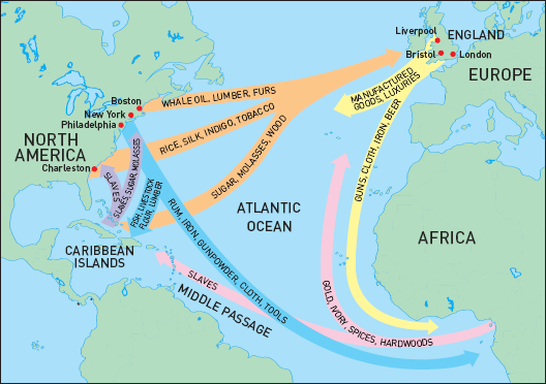<< Hide Menu
James Glackin
Jillian Holbrook
James Glackin
Jillian Holbrook
The Atlantic Ocean served as a highway that brought people from Europe, Africa, and the Americas together. Various goods, such as raw materials, foodstuffs, and textiles exchanged across continents through the transatlantic trade. Most importantly, the interactions and exchanges of people took place. These foreign contacts would have a significant impact on Europeans, colonists, slaves, and Native Americans.
Mercantilism
Mercantilism was an economic theory used by most European countries from c. 1500-1750. Mercantilists believed that wealth (gold and silver) equated to power and that accumulating the most gold granted the most power. To get gold, a country had to export more than it imported. In essence, mercantilist countries tried to export (sell) as much as possible, while importing (buying) as little as possible, thus building up their gold reserves.
Thus, mercantilism served as a European justification for acquiring colonies. Europeans could export products to their colonies for money while also importing raw materials from those colonies to manufacture goods.
Any hope that the colonists had for economic independence was crushed by the British policy of forbidding colonial trade with other countries under the Navigation Laws started in 1650. However, some colonists continued to smuggle products, and "salutary neglect" by Britain lasted until 1763 when the British were compelled to enforce laws for money to pay off the debt of the French and Indian War.
There were some advantages to mercantilism for the colonists. Colonists who produced shipping parts and tobacco for Britain had a permanent, lucrative British customer who demanded these products. Overall, mercantilism had a trickle-down effect on the prosperity of the colonies.
However, most colonists despised mercantilism based on principle because it did not allow them economic freedom to produce what they wanted and to sell it to other countries. The South produced rice, cotton, and tobacco—all cash crops. Yet Southerners despised that Britain controlled prices and the products that the southerners had to purchase
Triangular Trade

Image Courtesy of World Wide Imperialism
Triangular trade emerged as a result of mercantilism. In this international system, the Americas would send raw materials to Europe and Africa, Europe supplied Africa and America with finished goods, and Africa captured and transported slaves to the Americas.
The Americans produced and sent lumber, ship parts, iron products, furs, and tobacco to Europe, who in turn would supply the Americas with cloth, iron tools, tea, and furniture. The West Indies were a significant part of the trade with the Americas. Sugar and molasses went North to New England to make rum, which was then sent to Africa. Colonial food and timber were then sent to Jamaica and other profitable islands in exchange.

© 2024 Fiveable Inc. All rights reserved.